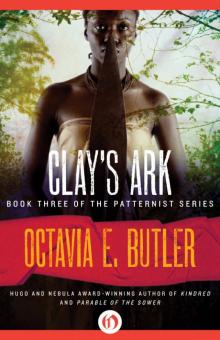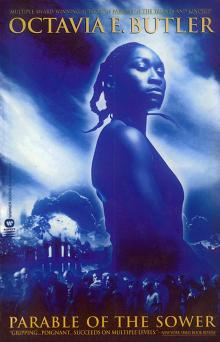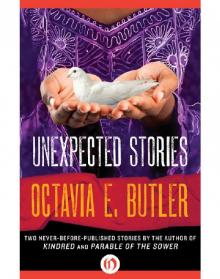- Home
- Octavia E. Butler
Clay's Ark Page 3
Clay's Ark Read online
Page 3
“Well … no twitches, but if you think I’m too outspoken, wait until you meet her.”
“What did she say?”
Uncharacteristically, Rane looked away. “It wasn’t anything that would help. I don’t want to repeat it.”
Keira touched Rane’s arm to get her attention. “Was it about you being more likely to survive than the two of us? Because if it was, we got that too.”
“Yes.”
“Plus?”
“Kerry, I’m not going to tell you.”
It must have been bad then. There was very little Rane would hesitate to say. Blake resolved to get it out of her later. Now, Eli was coming toward them, motioning them into the wood-and-stone house. The dark-haired woman, Meda, came with him, stopping abruptly in front of Blake so that he had to stop or collide with her. She was a tall bony woman with no attractiveness at all beyond the long, thick, dark brown hair. She may have been attractive once, but now she had no shape, poor coloring, and not even the sense to cover herself as Keira had. She wore jeans cut off at mid-thigh and a man’s short-sleeved shirt, buttoned to her skinny midriff, then tied. Blake wondered whether Rane might be right about the drugs.
“For your own sake,” Meda said quietly, “you ought to know that we can hear better than most people. I don’t usually care who hears what I say, but you might. Now what I told your kid, what she was too embarrassed to repeat, was that I meant to ask Eli for you. I like your looks. It doesn’t matter whether you like mine. Everybody here looks like me, sooner or later.”
“Jesus Christ,” Blake muttered disgustedly. He began to laugh, not meaning to, but not able to stop. “You are crazy,” he said, still laughing. “All of you.” The laughter died finally, and he could only stare at them. They stared back impassively.
“What are you going to do?” he asked Eli. “Give me to her?”
“How can I?” Eli asked. “I don’t think I own you. Meda and your kid have a way with words, Doc. With more people like them, we never would have avoided World War Three.”
Blake managed to stifle more laughter. He rubbed a hand across his forehead, and was surprised to find it wet. He was standing in the hot desert sun, but between his daughters and his captors, he had hardly noticed.
“What are you going to do with me?” he asked.
“Oh, you’ll spend some time with her. That can’t be helped. I wish it weren’t necessary, but she’s your jailer—which is what she was really asking to be. We’re going to have to confine you pretty closely for a while, and things will work out better if your jailer is a woman.”
“Why?”
“You’ll know, Doc. Just give it a little more time. Meanwhile, for the record, what you and Meda do together is your business.” He turned, faced Meda. “There are limits,” he said softly. “You’re getting to like this too goddamn much, you know?”
She glared at him for a moment. “You should talk,” she said harshly, though somehow, not quite angrily. She turned and went inside, slamming the door behind her.
Eli sighed. “Lord, I hope you’ll all make it—all three of you so we won’t have to do this again soon.” He glanced to where Ingraham stood watching, managed a crooked smile. “You figure she’ll feed us?”
“She’ll feed me,” Ingraham said, smiling. “She invited me to dinner. Let’s go in and see if she’s set a place for you.”
They herded Blake and the girls into the house, somehow communicating amusement, weariness, hunger, but no threat. It was almost as though the Maslin family had been invited to eat with new friends. Blake shook his head. On his own, he would have tried to break away from these people—whatever they were—long ago. Now … he wondered what his chances were of getting Eli alone, getting his gun and the car keys. If he didn’t move soon, Rane or Keira might be separated from him again. These people were in such bad physical condition, they had to take precautions.
Abruptly, it occurred to him that a simple precaution might be to drug something they were to eat or drink.
“What are you planning, Doc?” Eli asked as he sat down in a big, leather wing chair.
The house was cool and dark, comfortably well-kept and old. Blake had to fight off the feeling of security it seemed to offer. He sat on a sofa with his daughters on either side of him.
“Doc?” Eli said.
Blake looked at him.
“I wonder if I can stop you from getting hurt.”
“Forget it,” Ingraham said. “He’s going to have to try something. Just like you’d have to in his place.”
“Yeah. Listen, you still have that knife?”
“Sure.”
Eli nodded, gestured with one hand. “Come on.”
“You mark the wall and Meda’ll find some way to get you, man.”
“I’m not going to mark the damn wall. Come on.”
“Don’t break my knife either.” Ingraham reached toward his boot, then his hand seemed to blur. Something flashed toward Eli, Eli blurred, and the floorboards beneath Blake’s feet vibrated. Blake looked down, saw that there was a large, heavy knife buried in the floor between his feet. It had hit the wood just short of the oriental rug. He gave Eli a single outraged glance, then seized the knife, meaning to pull it free. It remained rooted where it was. He pulled again, using all his strength. Still the knife did not move. It occurred to him that he was making a fool of himself. He sat up straight and glared at Eli.
Eli looked tired and unamused. “Just a trick, Doc.” He got up, walked over, and tugged the knife free with little apparent effort. With one long arm, he handed it handle-first to Ingraham, while keeping his attention on Blake. “I know we look scrawny and sick,” he said. “We look like one of us alone would equal nothing at all. But if you’re going to survive, you have to understand that guns or no guns, you’re no match for us. We’re faster, better coordinated, stronger, and some other things you wouldn’t believe yet.”
“You think a circus trick is going to make us believe you’re superhuman?” Rane demanded. Blake had felt her jump and cringe when the knife hit. She had been frightened, so now she had to attack. His first impulse was to shut her up, but he held back, remembering the value Eli had placed on her. Eli might tell her to shut up himself, but he would not hurt her just for talking. And she might get something out of him.
“We’re not superhuman,” Eli said quietly. “We’re not anything you won’t be eventually. We’re just … different.”
“And sometimes you hurt,” Keira whispered.
Eli looked at her—looked until she stopped studying the pattern on the rug and looked back. “It isn’t like your pain,” he said. “It isn’t as clean as your pain.”
“Clean?”
“Mine is kind of like what an addict might feel when he tries to kick his habit.”
“Drugs?”
“No drugs, I promise you. We don’t even use aspirin here.”
“I use things. I have to.”
“We won’t stop you.”
“What are you?” she pleaded suddenly. “Please tell us.”
Eli put his hands behind his back, though not before Blake noticed that they were trembling.
“Hey,” Ingraham said softly. “You okay?”
Eli glanced at him angrily. “No, I’m not okay. Are you okay?”
Keira looked from one of them to the other, then spoke to Eli. “What is it you’re keeping yourself from doing to me?”
“Kerry,” Rane cautioned. That was a switch—Rane cautioning. Blake wanted to stop Keira himself, would have stopped her, had he not wanted an answer as badly as she did.
“Give me your hands,” Eli said to her.
“No!” Blake said, suddenly wary.
But Keira was already extending her hands, palms up, toward Eli. Blake grabbed her hands and pulled them down.
“You made a promise!” he said to Eli. “You said you’d keep her safe!”
“Yes.” Eli’s coloring looked worse than ever in the cool dimness of the room. His voice was almost too soft
to be heard. “I said that.” He was perspiring heavily.
“What were you going to do?”
“Answer her question. Nothing else.”
Blake did not believe him, but saw no point in saying so. Eli smiled as though Blake had spoken the thought aloud anyway. He unclasped his hands, and Blake noticed that even they were dripping wet. Diaphoresis, Blake thought. Excessive sweating—symptomatic of what? Emaciation, trembling, bad coloring, now sweating—plus surprising strength, speed, and coordination. God knew what else. Symptomatic of what?
“Want to hear something funny, Doc?” Eli said in an oddly distant voice. He held his wrist where Blake could see it and pointed to a small double scar that looked black against his gray-brown skin. “A couple of weeks ago while I was helping with the building, I got careless about where I put my hand. A rattlesnake bit me.” Eli laughed hollowly. “You know, the damn thing died.”
He turned stiffly and went to the door, no longer laughing.
“Eli?” Ingraham said.
“I got to get out of here for a while, man, I’m getting punchy. I’ll be back.” Eli stumbled out the door and away from the house. When Blake could no longer hear him, he spoke to Ingraham. “That did look like a snakebite scar,” he said.
“What the hell do you think it was?” demanded Ingraham. “I was there. The rattler bit him, tried to crawl off, then doubled up a few times and died. We kept the tail. Fifteen-bead rattle.”
Blake decided he was being lied to. He sighed and leaned back in silent rejection of whatever fantasy might come next.
“This whole thing is going to be hard on you, Doc,” Ingraham said. “You’re going to want to ignore just about everything we say because none of it makes any sense in the world you come from. You’ll deny and Rane will try to deny and it won’t make a damn bit of difference because one way or another, all three of you are here to stay.”
Past 5
THE DOGS WERE WINNING.
They had attacked almost in unison, furiously, angered by his alien scent. Together, they managed to bring him down before he could hurt either of them. Then the smaller one, who appeared to be part Doberman, bit into the arm he had thrown up to protect his throat.
Pain was the trigger that threw him into his changed body’s version of overdrive. Moving faster than the dogs could follow, he rolled, came to his feet, locked both hands together and battered the smaller dog down in midair. The dog gave a short shrieking cry, fell, and lay twitching on the ground.
The larger dog leaped for his throat. He threw himself to one side, avoiding its teeth, but hunger and weariness had taken their toll. He stumbled, fell. The dog lunged again. He knew he could not avoid it this time, knew he was about to die.
Then there was a thunderous sound—a shot, he realized. The dog landed awkwardly, unhurt, but startled by the sound. There was human shouting. Someone pulled the dog back before it could renew its attack.
He looked up and saw a man standing over him, holding an old shotgun. In that brief moment, he noted that the man was frightened both of him and for him, that the man did not want to do harm, but certainly would in self-defense, that this man, according to his body language, would not harm anything helpless.
That was enough.
He let his weariness, hunger, and pain take him. Leaving his abused body to the care of the stranger with the out-of-date conscience and the old-fashioned shotgun, he passed out.
When he came to, he was in a big, cool, blue-walled room, lying in a clean, comfortable bed. He smiled, lay still for a while, taking mental inventory of his already nearly healed injuries. His arm had been bitten and torn in three places. His hands and arms had been scratched and bruised. His legs were bruised. Some of this was from climbing the rocks to this house. Some was from climbing out of the red volcanic mountains where he had hidden when the ship was destroyed. His muscles ached and he was thirsty again. But more important, he was intensely hungry. Food was available now. He could smell it. Someone was cooking pork, roasting it, he thought, so that the savory meat smell drifted through the house and seemed almost edible itself. His body required more food than a normal person’s and in spite of his desert kills, he had been hungry for days. The food smells now made him almost sick with hunger.
He found a pitcher of water and a glass on the night table next to his bed. He drank all the water directly from the pitcher, then sat up and looked himself over.
He had been bathed, and clothed in someone’s gray pajamas. Whoever had removed his coverall and bathed him was probably ill. They would not realize it for about three weeks, but when the symptoms began to make themselves felt, chances were, his rescuer would go to a doctor and pass the infection on beyond this isolated place. And chances were, neither the rescuer nor the doctor would survive—though, of course, both would live long enough to infect others. Many others. Both would be infectious long before they began to exhibit symptoms. The doctor would not recognize the illness, would probably give it first to family and friends.
The ship had died, the three people he had come to love most had died with it to prevent the epidemic he had probably just begun. He should have died with them. But of the four, only his enhanced survival drive had saved him—much against his will. He had been a prisoner within his own skull, cut off from conscious control of his body. He had watched himself running for cover, saving himself, and thus nullifying the sacrifice of the others. To his sorrow, to his ultimate shame, he, and he alone, had brought the first extraterrestrial life to Earth.
What could he do now? Could he do anything? Was not the whole matter literally out of his hands? Had it ever been otherwise?
A woman came into the room. She was tall and rangy and about fifty—too old to attract his interest in any dangerous way.
“So,” she said, “you’re among the living again. I thought you might be. Are you hungry?”
“Yes,” he croaked. He coughed and tried again. “Please, yes.”
“Coming right up,” the woman said. “By the way, what’s your name?”
“Jake,” he lied. “Jacob Moore.” Jake Moore had been his maternal grandfather, a good man, an old-style, shouting Baptist preacher who had stepped in and taken the place of his father when his father died. It was a name he would not forget, no matter how his body distracted him. His own name would send this woman hurrying to the nearest phone or radio or whatever people in this desolate place used to communicate with the world outside. She would call the would-be rescuers he had hidden from for three days after the destruction of the ship, and she would feel that she had done him a great favor. Then how many people would he be driven to infect before someone realized what was happening?
Or was he wrong? Should he give himself up? Would he be able to tell everything he knew and dump the problem and himself into the laps of others?
The moment the thought came to him, he knew it was impossible. To give himself up would be an act of self-destruction. He would be confined, isolated. He would be prevented from doing the one thing he must do: seeking out new hosts for the alien microorganisms that had made themselves such fundamental parts of his body. Their purpose was now his purpose, and their only purpose was to survive and multiply. All his increased strength, speed, coordination, and sensory ability was to keep him alive and mobile, able to find new hosts or beget them. Many hosts. Perhaps three out of four of those found would die, but that magical fourth was worth any amount of trouble.
The organisms were not intelligent. They could not tell him how to keep himself alive, free, and able to find new hosts. But they became intensely uncomfortable if he did not, and their discomfort was his discomfort. He might interpret what they made him feel as pleasure when he did what was necessary, desirable, essential: or as pain when he tried to do what was terrifying, self-destructive, impossible. But what he was actually feeling were secondhand advance-retreat responses of millions of tiny symbionts.
The woman touched him to get his attention. She had brought him a tray. He
took it on his lap, trying, and in the final, driven instant, failing to return the woman’s kindness. He could not spare her. He scratched her wrist just hard enough to draw blood.
“I’m sorry,” he said at once. “The rocks …” He displayed his jagged nails. “Sorry.”
“It’s nothing,” the woman said. “I’d like to hear how you wound up out here so far from any other settlement. And here.” She handed him a linen napkin—real linen. “Wipe your hands and face. Why are you perspiring so? It’s cool in here.”
Present 6
IN SURPRISINGLY LITTLE TIME, Meda served a huge meal. There was a whole ham—Blake wondered whether it was homegrown—several chickens, more salad than Blake thought six people could possibly eat, corn on the cob, buttered carrots, green beans, baked potatoes, rolls… Blake suspected this was the first meal he had eaten that contained almost nothing from boxes, bags, or cans. Not even salt on most of the food, he realized unhappily. He wondered whether the food was clean and free of live parasites. Could some parasite, some worm, perhaps, be responsible for these people’s weight loss? Parasitic worm infestations were almost unknown now, but these people had not chosen to live in the present. They had adopted a nineteenth-century lifestyle. Perhaps they had contracted a nineteenth-century disease. Yet they were strong and alert. If they were sharing their bodies with worms, the worms were damned unusual.
Blake picked at the barely seasoned food, eating little of it. He wasn’t concerned about any possible worm infestation. That could be taken care of easily once he was free. And since everyone took food from the same serving dishes, selective drugging was impossible. He let the girls eat their fill. And he watched the abductors—especially Eli—eat prodigious amounts.
Keira tried to talk to him during the meal, but he gave the impression of being too busy eating to listen. Blake thought he tried a little too hard to give that impression. Eli was attracted to Keira; that was obvious. Blake hoped his ignoring her meant he was rejecting the attraction. The girl was sixteen, naive, and sheltered. Like most enclave parents, Blake had done all he could to re-create the safe world of perhaps sixty years past for his children. Enclaves were islands surrounded by vast, crowded, vulnerable residential areas through which ran sewers of utter lawlessness connecting cesspools—economic ghettos that regularly chewed their inhabitants up and spat the pieces into surrounding communities. The girls knew about such things only superficially. Neither of them would know how to handle a grown man who saw them as fair game. Nothing had ever truly threatened them before.

 Patternmaster
Patternmaster Survivor
Survivor Clay's Ark
Clay's Ark Bloodchild and Other Stories
Bloodchild and Other Stories Parable of the Sower
Parable of the Sower Wild Seed
Wild Seed Fledgling
Fledgling Unexpected Stories
Unexpected Stories Kindred
Kindred Lilith's Brood: Dawn / Adulthood Rites / Imago
Lilith's Brood: Dawn / Adulthood Rites / Imago Adulthood Rites
Adulthood Rites Mind of My Mind
Mind of My Mind Seed to Harvest
Seed to Harvest Lilith's Brood: Dawn, Adulthood Rites, and Imago (Xenogenesis Trilogy)
Lilith's Brood: Dawn, Adulthood Rites, and Imago (Xenogenesis Trilogy) Bloodchild
Bloodchild Seed to Harvest: Wild Seed, Mind of My Mind, Clay's Ark, and Patternmaster (Patternist)
Seed to Harvest: Wild Seed, Mind of My Mind, Clay's Ark, and Patternmaster (Patternist)